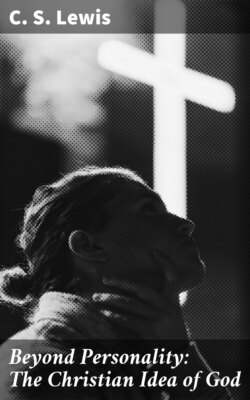Читать книгу Beyond Personality: The Christian Idea of God - C. S. Lewis - Страница 3
На сайте Литреса книга снята с продажи.
PREFACE
ОглавлениеTable of Contents
These Talks attempt to put into simple modern language the account of God which, to the best of my knowledge, the vast majority of Christian churches have agreed in giving for a great many centuries. I have tried to explain in previous talks why I think Christianity true. Here I am not trying to prove anything; only to describe what the Christian belief is. It is hoped that this may be of some use both to those who accept Christianity and to those who don’t: indeed it is not much good discussing whether certain beliefs are true before we know what they are. Some listeners were offended because I used the words ‘Christian belief’ to describe the doctrines officially held by organised Christianity at nearly all times and in nearly all countries. They themselves, though claiming to be Christians, differed from this official belief on certain points, and they were annoyed because I seemed to be saying that they were therefore no Christians: and ‘Who’s he’, they asked, ‘to lay down who is a Christian and who is not?’ In reality I was not attempting (in the sense they mean) to lay down anything of the sort. If anyone was asked to give an account, say, of Mohammedanism in seven very short talks he would be forced to concentrate on the general central Mohammedan tradition. He simply wouldn’t have time to go into minor variations, still less to deal with the beliefs of individual Mohammedans. In his talks the word ‘Mohammedanism’ would simply have to be used to mean that permanent central tradition. I dealt with Christianity in the same way. I should have had to do so even if I personally did not regard the central tradition as being Christianity at its truest. In point of fact I do regard it as true, and consequently I must think that those who depart from it are mistaken. Some people say this attitude is ‘intolerant’. ‘He’s the sort of man’, they complain, ‘who thinks his own 6 beliefs are true and everyone else’s are wrong.’ But after all how can any man help doing that? A man must think his own belief true because if he didn’t it would not be his belief. ‘Your belief’ means ‘what you think true’. And if you think one thing true, of course you must think the opposite false. But this is a very different thing from saying that those who hold the opposite belief are necessarily bad or stupid. There is a deeper sense of the word ‘Christian’ in which some who hold wrong beliefs may be more Christian than some who hold the right ones. Christ, who can see into their hearts, may recognise them as His own, and more His own than many of the orthodox. Needless to say, I never dreamed of laying down who was a ‘Christian’ in that sense. It would have been the grossest impudence for me even to raise the question, for neither I nor any mortal can possibly know the answer.
April 15th, 1944 C. S. LEWIS
